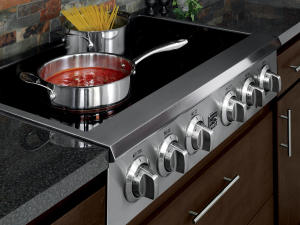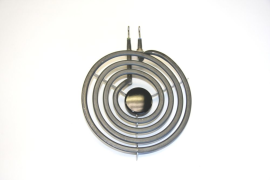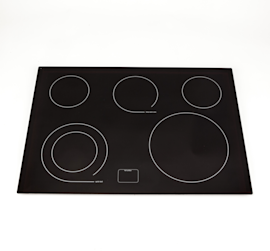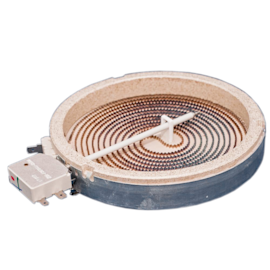- Kenmore refrigerator water filters
- Whirlpool refrigerator water filters
- Samsung refrigerator water filters
- GE refrigerator water filters
- LG refrigerator water filters
- Frigidaire refrigerator water filters
- KitchenAid refrigerator water filters
- Maytag refrigerator water filters
- Kenmore Elite refrigerator water filters
- Estate refrigerator water filters
- GE Profile refrigerator water filters
- Amana refrigerator water filters
- Bosch refrigerator water filters
- Dacor refrigerator water filters
- Electrolux refrigerator water filters
Choosing the best cookware for your glass cooktop


If you’ve noticed lately that foods cooked in pots and pans on your radiant glass cooktop aren’t cooking evenly, it might be time to consider new cookware. Find out if your old cookware is doing its job and see which popular cookware materials might be better for your glass cooktop.
For more troubleshooting tips and repair guides for your cooktop, check out our DIY cooktop repair help page. Order replacement parts for your DIY project at SearsPartsDirect.com.
Signs you need new cookware
Warped or curved bottom. Warped or curved bottoms on pots and pans can lead to uneven cooking because the bottom of the pan isn’t making good contact with the entire heating element. Check for flatness by setting a ruler across the bottom of the cookware in several places. There should be no gaps between the ruler and the bottom of the pan.
Loose-fitting lids. A lid that doesn’t fit tightly is a sign of a warped pot or pan and can cause uneven cooking because the bottom of the pan isn’t making good contact with the entire heating element.
Heavy handles. A handle that is too heavy for the container can tip the cookware—and the food in it—to one side. Not only can a tilted pan make food cook unevenly, it’s also unsafe.
Popular cookware materials
New cookware lines come out all the time. But before you buy one just because it’s pretty and matches the decor of your kitchen, make sure it’s the best fit for your radiant glass cooktop. The cookware material determines how fast and evenly your food cooks.
No matter what cookware you choose, remember this: Don’t slide pots and pans across your glass cooktop. Sliding can leave marks on or scratch your cooktop. Some marks can be removed, others you’ll be stuck with.
Aluminum heats up quickly and evenly. Some types of food may darken aluminum. Newer, anodized aluminum cookware resists staining and pitting better than older aluminum cookware. Aluminum cookware generally cleans easily with warm, sudsy water. Aluminum residue sometimes appears as scratches on the cooktop, but usually will come off if you clean it immediately.
Copper also heats up quickly and evenly, but it discolors easily. It may also leave metal marks on glass, like aluminum can. Copper needs to be polished regularly.
Stainless steel heats up slowly with uneven cooking results. However, stainless steel is durable, easy to clean and resists staining.
Porcelain-enamel performs well on glass cooktops only if the bottom is thick and flat. Porcelain-enamel coating must be smooth to avoid scratching the cooktop. Also, take care not to boil pans dry because porcelain can melt and fuse to cooktop.
Cast iron heats up slowly, but it retains heat very well. Cast iron cooks evenly once it reaches the cooking temperature. A big advantage is that you can also use cast iron in the oven. It’s generally not recommended for glass cooktops, however, because it can scratch the cooktop. It quickly becomes pitted and can rust easily if not cleaned properly.
Glass heats up slowly and isn’t recommended for glass cooktops because it may scratch the glass.
Symptoms for electric cooktops
Main causes: broken surface element, surface element switch failure, control system problem, surface element limiter swi…
Repair guides for electric cooktops

How to replace a coil surface element on an electric cooktop
Easily replace a coil surface element in 15 minutes or less by following these step-by-step instructions.…
Repair difficulty
Time required
15 minutes or less

How to replace the glass top on an electric cooktop
Don't use a cracked or damage glass cooktop—replace it, using these instructions to guide you.…
Repair difficulty
Time required
30 minutes or less

How to replace a radiant element on an electric cooktop
Follow these step-by-step instructions to replace a damaged radiant element on your electric cooktop when the element wo…
Repair difficulty
Time required
45 minutes or less
Articles and videos for electric cooktops

Learn about the differences between cooking on gas and electric stoves.…

Get tips on completing essential holiday cleaning tasks to brighten your home.…

Learn about all the convenient features on our Sears PartsDirect website that make your parts purchases easier.…